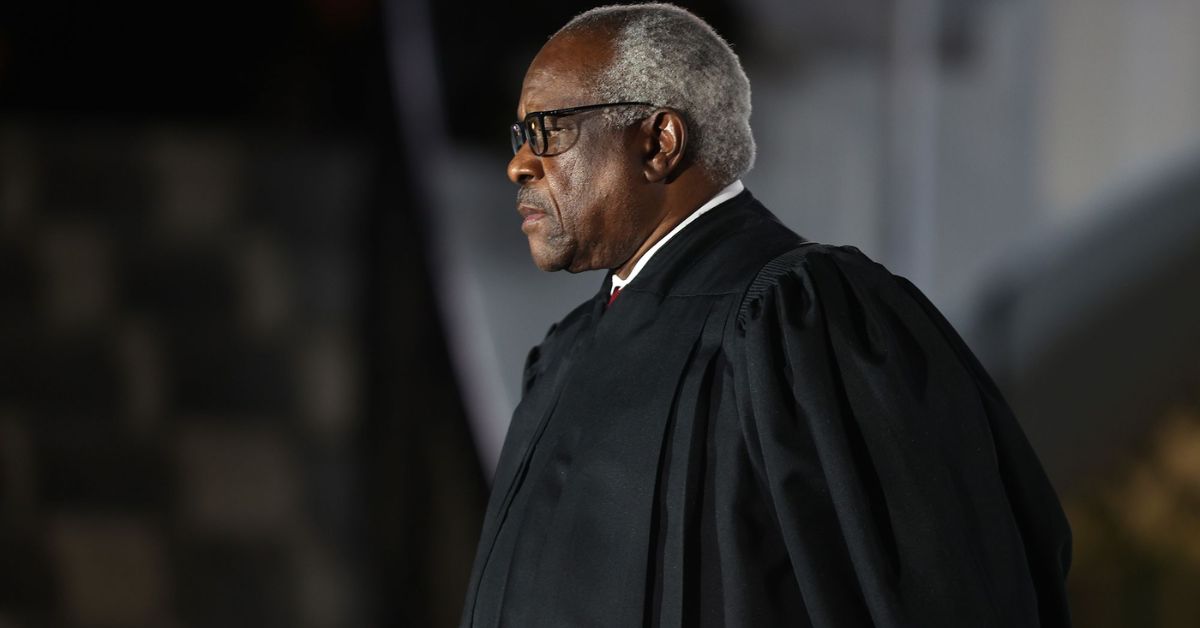According to CNN, a source close to Justice Clarence Thomas says he plans to modify his financial disclosure forms to include a real estate deal he made with a GOP megadonor in 2014. Thomas recognizes that the transaction should have been declared almost a decade ago.
Thomas and his longtime buddy and Dallas real estate mogul Harlan Crow are selling three houses in Georgia, including the one where Thomas’ 94-year-old mother, Leola Williams, presently resides. The insider claimed that Thomas always had support from his staff when filling out paperwork and that the failure to disclose the real estate transaction was an honest mistake.
Thomas, the source claims, didn’t feel he had to report the transaction because he lost money. According to the source, Thomas will evaluate the documents and make the necessary changes. The nonprofit journalism group ProPublica, which has been looking into the connections between Thomas and Crow, was the first to report on the real estate transaction.
ProPublica reports that Crow has contributed over $10 million to politics and backed initiatives to conservatively shift the judiciary. Thomas and his wife, Ginni Thomas, have been under fire for their lavish vacations on the donor’s private plane and boat without disclosing them.

In an unusual public speech, the justice explained that he did not report because he had been told he did not have to. Critics have long called for more openness from Supreme Court justices about their personal lives, and the recent revelations regarding Thomas’ ties to Crow are the latest example.
The court has also frequently ignored calls from critics and lawmakers to implement a comprehensive code of ethics for its members.
About two dozen Democratic members of Congress, led by Rhode Island Senator Sheldon Whitehouse and Georgia Representative Hank Johnson, have asked Chief Justice John Roberts to launch an investigation and asked the Judicial Conference, the policymaking body for the federal courts, to refer Thomas to the US attorney general for potential violations of the Ethics in Government Act of 1978.
These resources provide a centralized location for up-to-the-minute information on all things happening in the Golden State:
- Mother in Pennsylvania Strangles Son With Belt to Prevent Him From Facing Family’s Financial Troubles
- The Average Victim of Financial Fraud May Suffers a Loss of $7,076. How to Avoid It
“There is at least reasonable cause to believe that Justice Thomas intentionally disregarded the disclosure requirement to report the sale of his interest in the Savannah properties in an attempt to hide the extent of his financial relationship with Crow,” Whitehouse and Johnson said in a joint statement.
Thomas, his mother Leola Williams, and the family of Thomas’s late brother were all parties to the disputed real estate transaction in Savannah, Georgia. Crow purchased the house where Thomas’ mother had lived at 542 East 32nd Street in Savannah, as well as two additional properties that had been used as rentals.
Williams, who was 85 at the time of the acquisition, reportedly received an occupancy agreement allowing her to continue living in the property for the remainder of her life as part of the negotiated sale price. She does not pay rent, but must cover the cost of insurance and property taxes.
Last week, Crow claimed in a statement to CNN that he made the purchases so that he might “one day create a public museum at the Thomas home dedicated to telling the story of our nation’s second black Supreme Court Justice.”
In addition, he said that he paid a “market rate based on many factors including the size, quality, and livability of the dwellings.” Thomas’ mother’s house is still owned by Crow, while the other two were sold. The capital renovations Thomas and his wife made to his mother’s house reportedly cost between $50,000 and $70,000, and after the transaction was finalized, Thomas received $44,000.
Thomas, the source claims, did not see any reason to report because there was nothing to gain. However, as stated in Section VII of the financial disclosure form, a “transaction” must be reported regardless of whether or not there was a loss.
Supreme Court Justice Clarence Thomas defends lavish 'family trips' funded by GOP donor https://t.co/irtB5FWow5
— USA TODAY (@USATODAY) April 7, 2023
Fix the Court’s leader Gabe Roth said that the lack of disclosure of the real estate sale looks to be in violation of the federal Ethics in Government Act of 1978. “He should have listed the transaction in Part VII of his 2014 disclosure, but he didn’t,” Roth said in an email.
“If you’re a Supreme Court justice, and you sell a property you own, you have to list the transaction in your annual disclosure. That’s the law — even if Justice Thomas lost money, and even if the sale was to build a museum one day,” Roth said.
“The public has every right to know when top officials are buying and selling property,” Roth added. One person who has worked on nominees for the Senate Judiciary Committee and was previously a clerk for Justice Neil Gorsuch has described the attacks against Thomas as “repackaged smears.”
“Justice Clarence Thomas is a great man, and the Democrats’ latest political attacks are simply repackaged smears in a 31-year campaign of hatred to punish and delegitimize a conservative Black Justice who thinks for himself,” Davis said.
Thomas has been silent thus far on the property transaction. He acknowledged that the rules have changed since the initial stories about his lavish trips with the Crows surfaced and stated that it was his “intent to follow the guidance in the future.”
Thomas has had to revise his financial statements previously. He updated his tax returns in 2011 to include his wife’s salary from the Republican Heritage Foundation from 1998 to 2003. At the time, Thomas issued a statement saying the data had been “inadvertently omitted.” Common Cause had initially raised doubts, prompting the complaint.
When Thomas submitted his 2017 taxes, he omitted the amount for reimbursements relating to his time spent teaching at Creighton University School of Law. In addition, he updated his declaration in 2018 to include expenses for traveling to and eating at each of his two colleges’ campuses. Thomas made such adjustments in response to questions from the organization Fix the Court.
If you like us on Facebook, you will be the first to know about all of the most recent updates.




